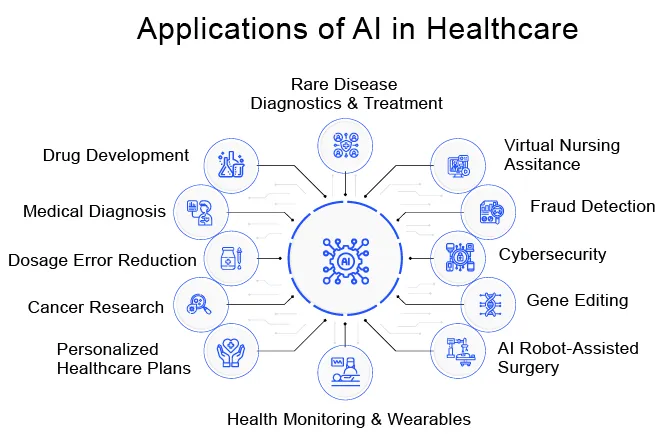Introduction:
Artificial Intelligence (AI) has become the linchpin for technological transformation, impacting diverse industries in 2024. As we delve into the myriad 10 AI Applications Exploding Across Industries in 2024. its revolutionary influence on robotics, defense, transport, healthcare, marketing, automotive, business, gaming, banking, and chatbots comes to light. This comprehensive exploration aims to provide an in-depth understanding of how AI is reshaping our world.
Follow us on Linkedin for everything around Semiconductors & AI
What is Artificial intelligence
Artificial Intelligence (AI) refers to the simulation of human intelligence in machines that are programmed to think, learn, and perform tasks typically requiring human intelligence. These tasks include problem-solving, understanding natural language, recognizing patterns, learning from experience, and adapting to new information.
Read More: Explained: What the hell is Artificial Intelligence – techovedas
Understanding Artificial Intelligence
AI is not merely a technology; it’s a dynamic force that enables machines to perform tasks associated with human intelligence, encompassing learning, reasoning, and problem-solving. In the rapidly evolving landscape of technology, AI applications stand out as powerful tools capable of handling complex challenges efficiently.
AI Statistics You Can’t Ignore
- The AI market is poised to reach an astounding $190.61 billion by 2025.
- A staggering $15.7 trillion is expected to be added to the global GDP by 2030 through AI.
- Approximately 40% of individuals engage in daily voice searches.
- Nearly 77% of devices worldwide incorporate AI technology.
- The growth of AI startups has experienced a remarkable 14-fold increase since 2000.
Applications of Artificial Intelligence
1. AI Applications in Robotics
The field of robotics is witnessing a paradigm shift with advanced AI tools. Modern robots, equipped with sensors, cameras, and voice recognition devices, learn from experiences, optimizing manufacturing processes in industries such as aerospace.
Real-life Example:
Boston Dynamics’ Spot, a four-legged robot, utilizes AI algorithms for dynamic navigation, task execution, and learning from interactions. Spot’s ability to adapt to changing environments showcases AI’s potential in robotics.
2. AI Applications in Defense
AI plays a critical role in fortifying defense security systems against cyber threats. By analyzing vast datasets, AI identifies suspicious activities, learns from data, and distinguishes between authorized and unauthorized access, ensuring the integrity of military databases.
Real-life Example:
Project Maven, initiated by the Pentagon, employs AI for image recognition in drone-collected visual data. This application streamlines data analysis, enhancing defense capabilities through efficient utilization of AI.
3. AI Applications in Transport
The transport industry undergoes a revolution with AI-driven predictive analytics. From optimizing pricing based on factors like seasons to personalized notifications for passengers, AI enhances efficiency and user experience in services like online ride-sharing.
Real-life Example:
Uber’s dynamic pricing model relies on AI algorithms to predict ride prices based on demand, traffic patterns, and external factors. This real-time optimization illustrates AI’s role in improving transport services.
4. AI Applications in Healthcare
AI emerges as a cornerstone in healthcare, facilitating tasks from patient diagnosis to data management. Advanced algorithms analyze patient data, while AI-based devices measure real-time health metrics, enabling remote monitoring and accurate disease diagnosis.
Real-life Example:
IBM’s Watson Health employs AI to analyze medical literature, patient records, and clinical trials data, assisting oncologists in identifying personalized treatment options. This highlights AI’s potential in revolutionizing healthcare decision support.
Read More: What is the Role of Processors in Artificial Intelligence (AI) Revolution – techovedas
5. AI Applications in Marketing
In the business realm, AI transforms marketing strategies with personalized advertisements, recommendation systems, and targeted advertising. AI algorithms understand customer interests, boost revenue, and create a more engaging experience.
Real-life Example:
Amazon’s recommendation engine utilizes AI to analyze user preferences and behaviors, providing personalized product suggestions. This tailored approach significantly contributes to Amazon’s sales and customer satisfaction.
6. AI Applications in the Automotive Industry
The automotive industry embraces AI with the development of self-driving cars. Utilizing sensors, cameras, and AI algorithms, self-driving cars analyze surroundings, optimize routes, and revolutionize the driving experience.
Real-life Example:
Tesla’s Autopilot system employs AI algorithms for autonomous driving. The car’s sensors and cameras continuously gather data, enabling real-time decision-making to navigate various driving conditions.
Read More: What is Hardware Artificial Intelligence: Components Benefits & Categories – techovedas
7. AI Applications in Business
Businesses deploy AI to enhance customer relationships, automate tasks, and streamline processes. From robotic process automation to personalized customer service through chatbots, AI contributes to increased sales, predictive analysis, and overall efficiency.
Real-life Example:
Salesforce’s Einstein AI provides personalized customer insights, predicts future trends, and automates routine tasks for businesses. This empowers sales teams to make data-driven decisions and enhance customer engagement.
8. AI Applications in Gaming
AI plays a pivotal role in the gaming industry, creating interactive and adaptable gaming experiences. NPCs governed by AI provide unique entertainment, acting intelligently or artistically. AI-driven game development and character behavior enhance user engagement.
Real-life Example:
OpenAI’s GPT-3 powers interactive storytelling in video games, generating dynamic and context-aware narratives. This showcases the potential of AI in creating immersive gaming experiences with adaptive storytelling.
9. AI Applications in Banking
The banking sector harnesses AI for automation, fraud detection, and algorithmic trading. AI systems identify abnormalities, trace card usage patterns, and enhance security, contributing significantly to fraud prevention and risk management.
Real-life Example:
JPMorgan Chase utilizes AI-powered algorithms for fraud detection, analyzing patterns in transactions to identify and prevent unauthorized activities. This proactive approach safeguards customer accounts from potential threats.
10. AI Applications in Chatbots
AI-powered chatbots revolutionize customer service, understanding natural language and providing real-time responses. Integrated into websites and apps, these chatbots enhance customer satisfaction by addressing queries, offering assistance, and streamlining communication.
Real-life Example:
Facebook Messenger’s AI chatbots enable businesses to provide instant customer support, answer inquiries, and facilitate transactions. This real-time interaction showcases the efficiency and convenience of AI-driven chatbots in customer service.
Conclusion
As we navigate the 10 AI Applications Exploding Across Industries in 2024., it’s evident that AI is more than a technological shift; it’s a dynamic force shaping the future of industries. From healthcare to gaming, businesses to defense, AI’s impact is profound and promises a future
where automation and machine algorithms play pivotal roles. Embracing this AI revolution is not just an option; it’s a necessity for staying competitive and innovative in the digital era. The applications of AI continue to evolve, offering new possibilities and reshaping our world in unprecedented ways.




